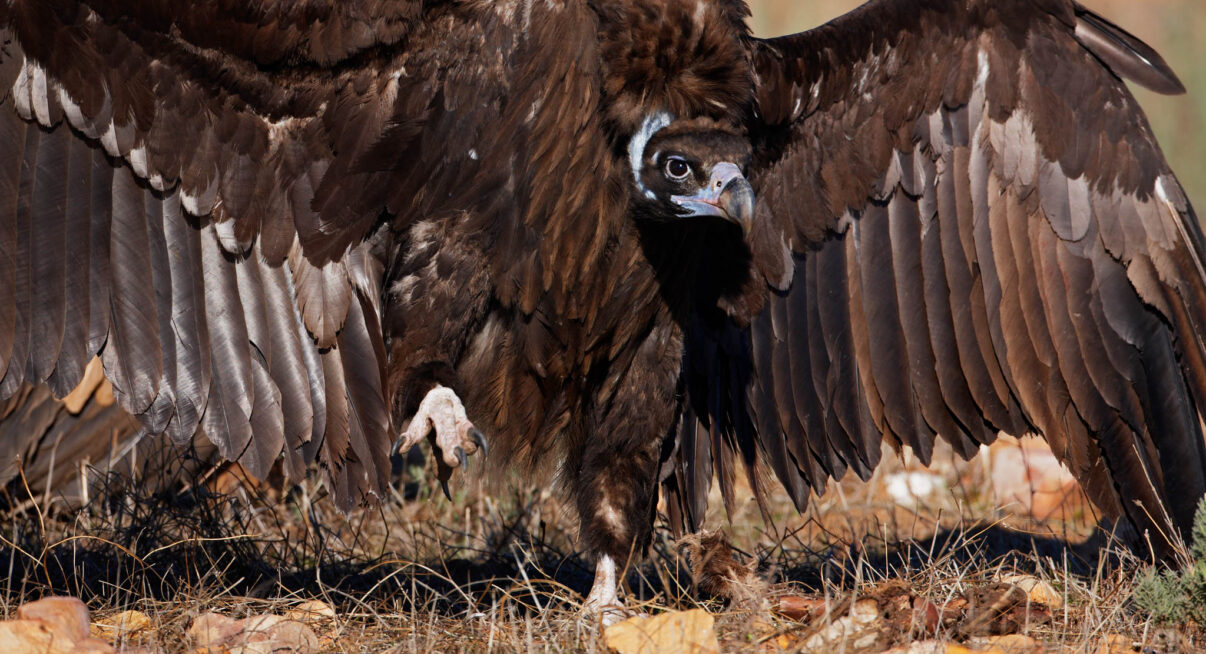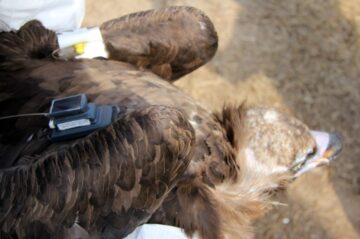During the last few weeks, 11 black vultures were equipped with satellite transmitters in Dadia National Park, in the Greek part of the Rhodope Mountains. These transmitters will provide important scientific data about the distribution, movements and possible threats, which will further help identify future conservation actions for the species in this region. These actions are part of the LIFE Vultures project.

The Rhodope Mountains are home to the only breeding colony of the black vulture in the Balkans; some 20 – 30 pairs breed yearly in the Dadia National Park in the Greek part of this mountain range. The number of breeding pairs has been stable or slightly declining over the past few years.
The black vulture is classified as ‘nearly threatened’ on the IUCN Red List of Threatened Species. One of the main objectives of the LIFE Project “Conservation of black and griffon vultures in Rhodope Mountains” (LIFE Vultures) is the recovery and further expansion of both black and griffon vulture populations in this part of the Balkan region. Project activities are run by Rewilding Europe in partnership with Rewilding Rhodopes Foundation, Bulgarian Society for the Protection of Birds/BirdLife Bulgaria (BSPB), WWF Greece, Vulture Conservation Foundation and Hellenic Ornithological Society/BirdLife Greece.
The transmitters have been fitted on 11 Black vultures by the Management Body of the Dadia National Park who is WWF Greece subcontractor. Satellite tracking of these eleven birds now enables the vulture experts of our BirdLife partners in both countries to gather a lot of useful information. The aim is that ultimately 20 black vultures and a similar number of griffon vultures will carry such transmitters. While putting on the transmitters, a lot of other important information was collected on the conditions of these birds, including blood samples.
“The transmitters pose no threat to the vultures’ health or condition,” comments Volen Akrumarev from BSPB. “They weigh less than 3% of the body weight of the vultures, only about 30 or 40 grams.”

The Bulgarian part of the Rhodope Mountains is an important part of home range of black vultures breeding in Dadia, but also a possible site where immature birds may settle and start breeding. The tracking information will help the team to identify suitable places for building artificial nests on the Bulgarian side of the Rhodope Mountains, stimulating birds to start another colony here. Earlier this year, the team constructed the first three artificial nests to attract the birds. Supporting the establishment of new (satellite) colonies of the Dadia colony might help the species to increase and it reduces risks.
The most suitable locations for the artificial nests were identified by computer models, based on current knowledge. New information that will come from the satellite transmitters is now feeding the computer models. Based on this, new potential breeding locations will be identified. In these locations, and 12 more artificial nests will be put in place before the end of the LIFE Vultures project in 2021. The new transmitters are already working and sending the first data. So far, this information showed that two Greek black vultures already crossed the border, visiting the core rewilding area in Bulgaria.
Besides transmitters, birds are also marked with colour rings and numbered wing tags, to be able to track these individuals visually as well.